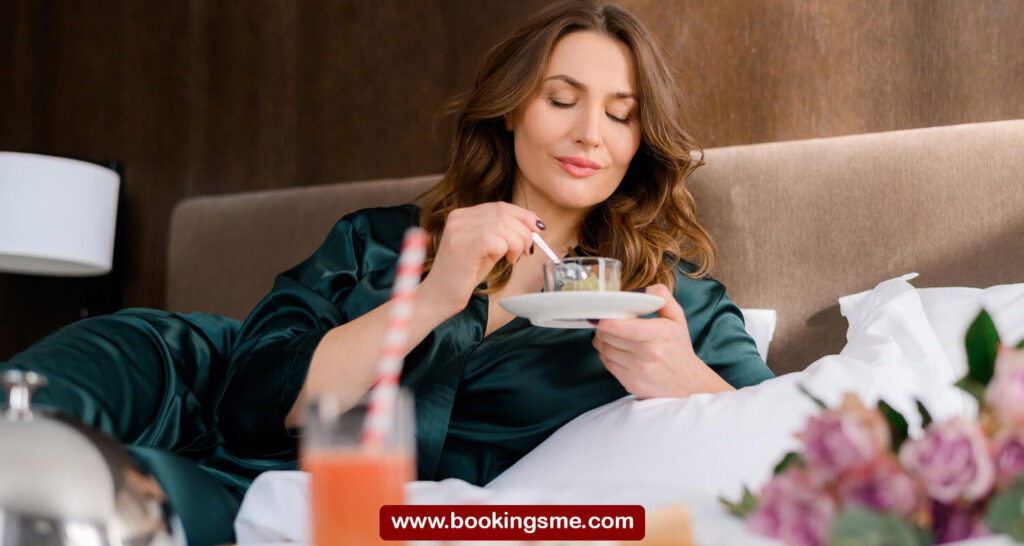The moment you step into a luxurious hotel lobby, you are enveloped in a distinct and inviting aroma that instantly sets the tone for a comfortable and pleasant stay. Many travelers find themselves pondering the question, how do hotels smell so good? The answer lies in a combination of carefully curated scents, strategic design, and the implementation of various sensory elements. In this article, we will delve into the fascinating world of hotel fragrances, exploring the art and science behind the creation of that signature olfactory experience.
Read also: Hotel Room with Rose Petals and Candles
Creating a Lasting Impression
Hotels understand the importance of making a lasting impression on their guests, and scent plays a crucial role in this process. The olfactory sense is closely linked to memory and emotion, making it a powerful tool for shaping perceptions. Hoteliers recognize that a distinctive and pleasant fragrance can contribute significantly to guests’ overall satisfaction and enhance their perception of the establishment.
The Psychology of Scent
To comprehend how hotels achieve that alluring aroma, it’s essential to consider the psychology of scent. Certain fragrances have the ability to evoke specific emotions and memories. For hotels, selecting the right scent involves understanding the desired atmosphere and the emotional response they want to elicit from guests. Whether it’s a calming lavender in a spa area or a refreshing citrus note in a lobby, each choice is intentional and aligns with the hotel’s brand image.
Customized Fragrances
Many upscale hotels take the extra step of creating custom fragrances that are unique to their brand. These bespoke scents are often developed in collaboration with perfumers who specialize in creating olfactory identities. The process involves a meticulous selection of individual notes, experimenting with different combinations until the perfect blend is achieved. This exclusive fragrance becomes an integral part of the hotel’s identity, leaving a lasting impression on guests who associate it with the luxurious experience.
Diffusion Techniques
Once the ideal fragrance is crafted, hotels employ advanced diffusion techniques to ensure a consistent and subtle presence throughout the property. High-end hotels invest in state-of-the-art scenting systems that disperse the fragrance evenly, avoiding overpowering guests while maintaining a continuous and subtle aroma. This attention to detail enhances the overall guest experience and reinforces the hotel’s commitment to creating a comfortable and welcoming environment.
Strategic Placement
Beyond diffusion systems, hotels strategically place scented elements in specific areas to enhance the overall ambiance. Scented candles, diffusers, and air fresheners are carefully positioned in lobbies, hallways, and common areas to create a cohesive and immersive experience. The goal is to engage guests’ senses from the moment they enter the hotel, leaving a positive and lasting impression.
Collaboration with Expert Perfumers
The collaboration between hotels and expert perfumers is a crucial aspect of achieving that distinctive scent. Perfumers, with their deep understanding of fragrances and their ability to create unique blends, work closely with hotel management to capture the essence of the brand. This collaborative effort ensures that the chosen scent aligns with the hotel’s identity and resonates with its target audience.

How Do Hotels Smell So Good
The Varied Fragrances Transforming the Hotel Experience
Hotels employ a diverse range of scents to create a welcoming and memorable atmosphere for their guests. Each type of smell is carefully chosen to evoke specific emotions and contribute to the overall ambiance. Here are some common types of smells that hotels use to enhance the guest experience:
- Citrus Fragrances:
Lemon, Orange, and Grapefruit: Citrus scents are known for their refreshing and uplifting qualities. Hotels often use these fragrances in lobbies and common areas to create a vibrant and energizing atmosphere.
- Floral Scents:
Lavender, Rose, and Jasmine: Floral fragrances are popular in hotel spas and relaxation areas. These scents are associated with tranquility and can contribute to a calming environment, promoting relaxation and well-being.
- Woody and Earthy Notes:
Sandalwood, Cedarwood, and Vetiver: These warm and grounding scents are often used in upscale hotels to create a sense of luxury and sophistication. They add depth to the overall olfactory experience, especially in guest rooms and lounges.
- Herbal Aromas:
Eucalyptus, Mint, and Basil: Herbal scents are frequently employed in wellness areas or fitness centers within hotels. These invigorating fragrances can provide a sense of freshness and cleanliness.
- Oceanic and Breezy Smells:
Sea Breeze, Ocean Mist: Some hotels, especially those in coastal locations, use oceanic scents to evoke a sense of being by the sea. These light and breezy fragrances are commonly found in beachfront resorts.
- Spice and Warmth:
Cinnamon, Vanilla, and Nutmeg: Hotels seeking to create a cozy and inviting atmosphere may opt for spicy and warm scents. These fragrances are often used in colder seasons or in areas like hotel restaurants.
Customized Signature Scents:
Some upscale hotels go a step further by creating their own signature fragrances. These unique blends are carefully crafted to reflect the hotel’s brand identity and provide a one-of-a-kind olfactory experience for guests.
Aromatherapy and Well-being
In addition to creating a pleasant atmosphere, hotels often incorporate aromatherapy principles into their fragrance choices. Certain scents, such as lavender or eucalyptus, are known for their calming and stress-relieving properties. By infusing these elements into the hotel environment, establishments aim to enhance guests’ well-being and contribute to a relaxing stay. The use of aromatherapy aligns with the growing trend of holistic hospitality, where the emphasis is on providing a comprehensive and rejuvenating experience.
Read also: Where Is the Hotel from the Shining
Maintaining Consistency
Consistency is key when it comes to the olfactory experience in hotels. Guests expect the same inviting fragrance throughout their stay, whether they are in the lobby, guest rooms, or spa areas. To achieve this, hotels implement rigorous maintenance protocols for their scenting systems, regularly checking and replenishing fragrance diffusers to ensure a seamless and continuous aromatic experience.
Brand Identity and Guest Loyalty
The distinctive scent of a hotel becomes a part of its brand identity and can significantly contribute to guest loyalty. Returning guests often associate the familiar fragrance with positive memories, creating a sense of comfort and attachment. This emotional connection reinforces brand loyalty, prompting guests to choose the same hotel for future stays and recommend it to others, thereby contributing to the hotel’s long-term success.
Conclusion
In conclusion, the captivating aroma that greets guests in hotels is a result of a meticulous blend of art and science. From the careful selection of custom fragrances to the strategic placement of scented elements and the collaboration with expert perfumers, hotels invest in creating a sensory experience that leaves a lasting impression.
The intentional use of scent not only enhances the overall ambiance but also plays a crucial role in shaping guests’ perceptions and emotions. The next time you find yourself wondering, how do hotels smell so good remember that it’s a carefully orchestrated symphony of fragrances designed to elevate your stay and create a memorable experience.
Why do hotels use specific scents?
Hotels use specific scents to create a unique and memorable atmosphere, enhancing the overall guest experience. The chosen fragrance contributes to the hotel’s brand identity and influences guest perceptions positively.
How do hotels choose the right scents?
The selection of scents is influenced by factors such as the target audience, location, climate, and brand identity. Hoteliers carefully consider these elements to create a harmonious olfactory experience for guests.
What methods do hotels use to diffuse scents?
Hotels employ innovative techniques like air diffusers and scented amenities to evenly spread fragrances throughout their properties. These methods ensure a consistent and immersive scent experience for guests.
Do scents in hotels impact guest mood and well-being?
Yes, pleasant scents have the power to uplift moods and enhance well-being. Hotels strategically use fragrances to create a positive and relaxed ambiance, contributing to a more enjoyable stay for guests.
Are there challenges in using scents in hotels?
Hotels face challenges such as guest sensitivities and the need to strike the right balance in scenting. Ensuring that the fragrance is noticeable without being overpowering is an ongoing concern in the hospitality industry.



3 thoughts on “How Do Hotels Smell So Good?”